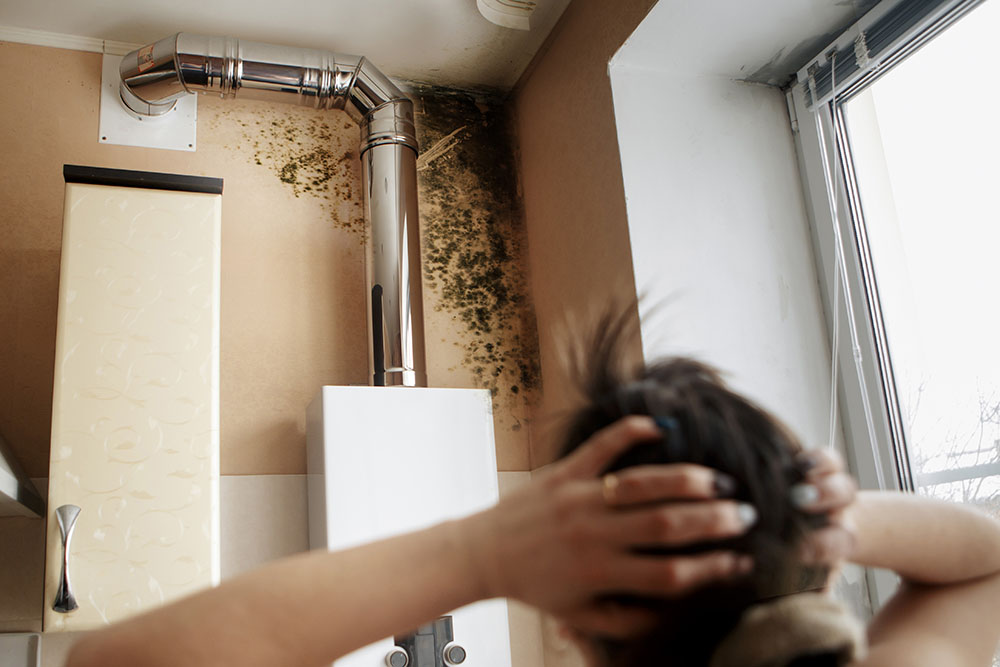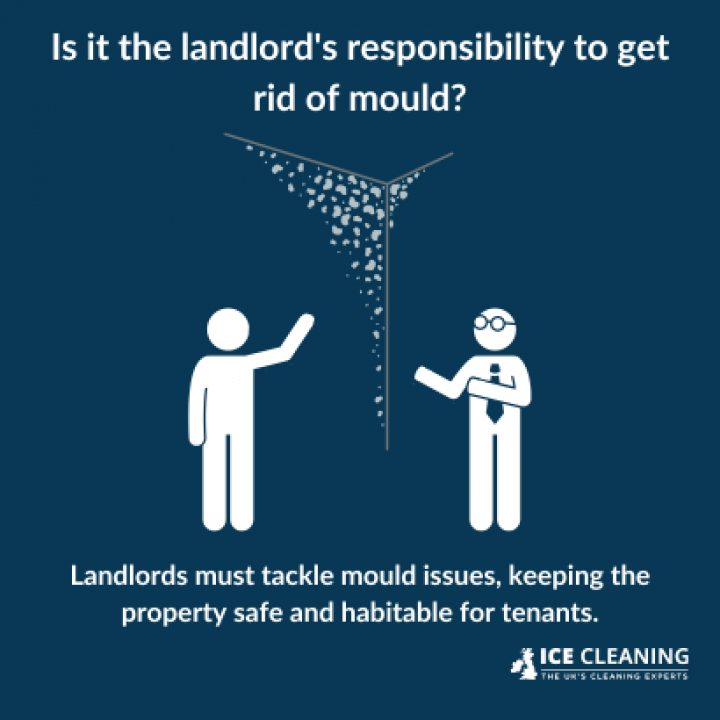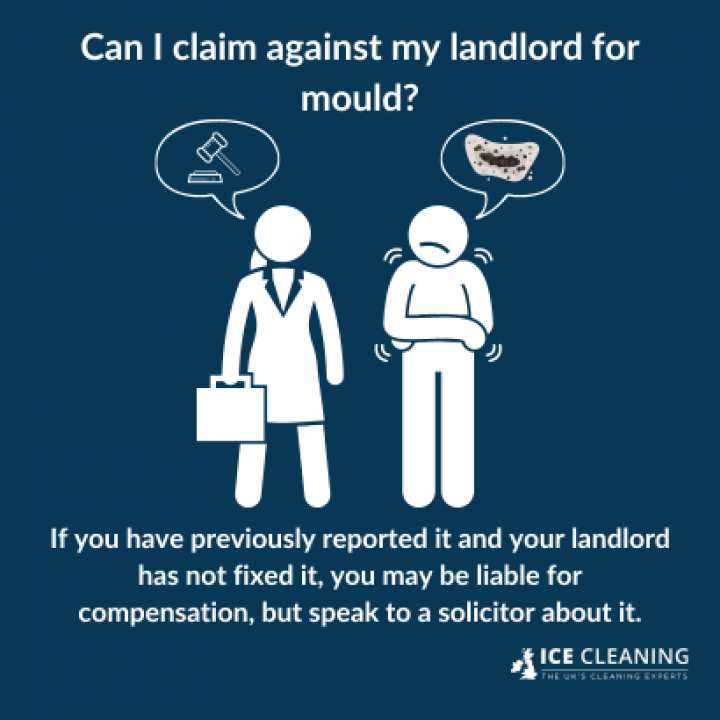What Can You Do If Your Rental Property Has Mould?

CONTENTS
- Understanding mould infestation in rental properties
- Tenant rights and landlord responsibilities
- Identifying signs of mould in your home
- Professional assessment and remediation of mould
- Preventative measures to control moisture and prevent mould
- Frequently asked questions
- Get in touch
The issue of mould infestations in rental properties is complex, with implications for landlords and tenants. It is an all-too-common problem that can pose serious health risks if not addressed promptly and effectively.
At ICE Cleaning, our mould cleaning services are paving the way against mould growth in the UK. We utilise leading technology and industrial-grade solutions to discover the root cause of mould, helping you prevent it from returning in the future.
Read on to learn more about what you should do if mould grows in your rental home.
Understanding mould infestation in rental properties
Mould infestations are a common issue encountered in rental properties. Poor ventilation, high levels of moisture, and neglectful maintenance all trigger the formation of these problems.
The primary cause of mould growth is the presence of dampness or water leakage within the property. This could result from plumbing issues, poor insulation leading to condensation on walls and windows, or even flooding.
Additionally, poorly ventilated spaces such as bathrooms and kitchens often become breeding grounds for mould due to high humidity.
Prolonged exposure to any form of mould can lead to serious health problems ranging from allergies and asthma attacks, to more severe complications, such as neurological damage or immune system suppression.
Tenant rights and landlord responsibilities
As a tenant or landlord, it is crucial to understand your respective rights and responsibilities concerning mould in rental properties. Mould can lead to serious health issues like respiratory problems, allergies, and skin irritations.
Therefore, maintaining an environment free from mould infestation protects the occupants' health and preserves the property's structural integrity.
Landlord's legal obligations
The UK government states that landlords are responsible for most repairs on their property. This includes dealing with dampness caused by structural defects, which often leads to mould growth.
In addition, under Section 11 of the Landlord and Tenant Act 1985, landlords must ensure that their rented premises offer a healthy living environment throughout the tenancy period.
Tenant's rights concerning mould
A tenant has legal rights if they discover mould within their rental unit due to negligence because of their landlord. The Housing Health and Safety Rating System (HHSRS) allows tenants to request an environmental health assessment from local authorities, who can then order remedial actions against negligent landlords.
Maintenance standards
For maintenance standards regarding mould prevention, both parties have roles to play. Landlords are responsible for fixing leaks and providing adequate ventilation facilities, whilst tenants must utilise these facilities properly and avoid activities that encourage mould growth.
Identifying signs of mould in your home
Mould infestations can pose serious health risks and damage to property if not addressed promptly. Tenants, homeowners, and landlords must understand the signs of mould presence in a rental space, which include:
- Black or green spots on walls, ceilings, or furniture
- Damp spots across various surfaces
- A musty odour in damp rooms
- Tenants experiencing coughing, sneezing, and skin rashes
Taking preventive measures is equally important in ensuring your rental property remains mould-free. Regular property inspections, adequate ventilation, controlling humidity levels and immediate repair of any leaks are key steps towards this goal.
Professional assessment and remediation of mould
Engaging professional services for a mould assessment and remediation is imperative. This ensures that the issue is addressed and prevents potential health hazards associated with exposure to certain types of mould.
Trained professionals employ advanced techniques such as infrared imaging and moisture metering to detect hidden growths within walls or under flooring.
They can accurately identify the type of mould present, its extent, and possible causes - information crucial in formulating an effective remediation strategy.
Mould remediation involves cleaning visible growths and addressing issues contributing to growth. The process typically includes containment, removal, cleaning, drying out damp areas, repair work if necessary, and post-remedial testing to ensure complete eradication.
Ensuring complete removal
Guaranteeing the elimination of mould infestations from rental properties requires follow-up inspections by certified professionals after initial treatment is completed.
These re-inspections should ideally take place 24-48 hours afterwards when surfaces are dry enough not to harbour residual spores but still damp to reveal any recurrent growth from unresolved leaks or condensation problems.
These routine checks also confirm whether previous control measures were successful, reassuring landlords and tenants.
Preventative measures to control moisture and prevent mould
The presence of mould in rental properties can lead to various health issues for tenants, including respiratory problems and allergic reactions. Therefore, it is crucial that landlords and tenants take proactive steps towards controlling moisture levels within the property to prevent mould growth.
- Maintaining ventilation: Regularly open windows, especially after cooking or showering, and using extractor fans in bathrooms and kitchens.
- Routine inspections: Landlords should regularly inspect their properties to detect damp or leaks.
- Regular cleaning: Tenants should keep the property clean and dry, wiping down condensation and reporting any signs of water damage or leaks.
- Drying clothes properly: Tenants must dry their clothes outdoors or on a heated clotheshorse near an open window.
- Dehumidifier use: Landlords must provide tenants with dehumidifiers if some areas are experiencing damp.
Managing mould in rental properties requires concerted efforts from landlords and tenants to control moisture effectively. By adopting these preventative measures, you can create healthier living environments while preserving the structural integrity of rental properties.
Frequently asked questions
Is it the landlord's responsibility to get rid of mould?
Landlords must tackle mould issues, keeping the property safe and habitable for tenants.
Can I leave my rental if there is mould?
If the mould makes living conditions unsafe or unbearable, discuss breaking your lease early with a solicitor.
Is it illegal to rent a property with mould?
Renting out properties with damp and mould breaches health and safety standards, and may be considered unlawful.
Can I claim against my landlord for mould?
If you have previously reported it and your landlord has not fixed it, you may be liable for compensation, but speak to a solicitor about it.




Get in touch
Our mould remediation services at ICE Cleaning utilise leading technology and solutions to effectively remove mould from homes and businesses alike. We work closely with your local council to ensure you are receiving the best care during a mould infestation.
To learn more about our mould removal services, call us today at 0208 066 0360 or enquiries@icecleaning.co.uk for a free quote and site survey. We provide emergency cleaning services across the UK with teams stationed, 24/7, 365 days a year, able to come to you no matter where you are.

Speak with me today,
I’m here to help
By asking you a few questions either via phone or email I can immediately provide a realistic estimation of the cost.
You’re in good company. We’ve cleaned for the following commercial clients… View all

Why choose us?
- Cater to a wide variety of cleaning situations
- Nationwide coverage, available 24/7
- Cater to commercial and domestic clients
- Free survey provided prior to quotation
- Emergency response team
- Offer a bespoke service designed to suit all your needs
- All technicians hold professional health and safety qualifications, including BICSc, IOSH, Dewpoint Professional & Safe Contractor
We’re fully accredited
We place best practise, professional expertise and health and safety at the core of our business. We’re fully compliant with all legal obligations. You can view a list of our accreditations below, or visit our Health & Safety page for more information.











-RGB-small.1707319151.jpg)




















